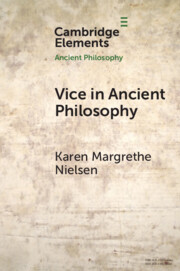Element contents
Vice in Ancient Philosophy
Published online by Cambridge University Press: 19 December 2023
Summary
Information
- Type
- Element
- Information
- Series: Elements in Ancient PhilosophyOnline ISBN: 9781108581738Publisher: Cambridge University PressPrint publication: 18 January 2024
